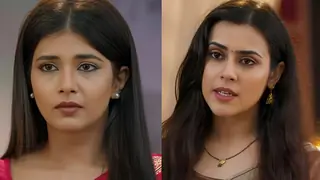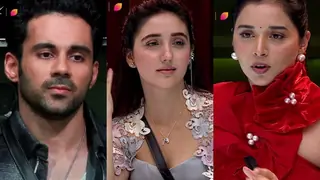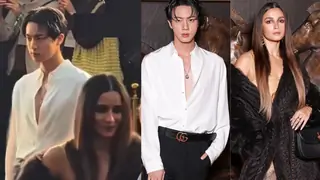Posted:
| "In the olden days when you wanted to do a sad song you had Talat Mehmood; if you wanted to do a happy song you had Rafi saab. But today any singer can do anything" – Zakir Hussain | ||||||
| Zakir Hussain, reverently deemed a national treasure of India, has not only made waves in the Indian film industry but also in the global music scene. He has recently composed music for Rahul Dholakia's thought-provoking film Parzania. Read on, as the Ustad unveils the story of his vivid career, his greatest inspirations, and of course…his first love, music! Tell us something about the music of Parzania. Are there any songs or only background score? The whole music score of the film is essentially a background music score. Even though there are a couple of songs in the film, they are situational, just to enhance the visual statement. That's what the film's music is all about. It has got the flavour of Gujarat because the movie is based there. There is a title song and one more situational song, but the rest of it is pretty much a background score. I'm especially proud to be connected with this project, I have to say. We have to be aware of our existence in this part of the world and whether it is a valid one. To be a part of this project has been very special to me. You have composed a lot of world music and fusion music as well. Have you incorporated those elements in the music of Parzania? These days if you listen to the music of any film or solo artist, you will not find a focused flavour in it. You will find much more of a panorama of flavours of music. Each film that you see, whether it is an Indian Bollywood film or a Hollywood film, or even some television series here or in America, or anybody's record, you will find that they have all been influenced by the sounds of the world. And so when we get involved in doing the music of any film or any other project, the whole idea is to pay that kind of respect to different sources of music that we have been exposed to. So, I felt that in this film, although the basic underlining flavour is that of West India, there are elements in there which point to sources that are other than Indian. So yes, we tried to use a well-spread blanket of tonal inspirations.
I think it is great; I think it's beautiful that there are people in the upper stratum of the bureaucratic part of the world who have actually taken notice of a film that is somebody's statement on our way of life. I don't think that any art created in this world is created with political intentions in mind. Art and politics don't mix. In that sense, I feel the film getting nominated is because of how well it was directed, how good it looks and how good the performances are. So when you keep these things in mind, I think proper justice was done to Parzania. It deserves that credit, and I am proud to be connected with this project. I remember Aparna Sen's film Mr. & Mrs. Iyer which I did music for was also in the running for an award at the time. It's a great feeling to be connected with projects that are recognized by your peers. How did your venture into Bollywood happen? I was twelve years old when I was playing the tabla in Bollywood recordings. I was playing for Shankar-Jaikishen, Laxmikant-Pyarelal, Madan Mohan and S.D. Burman amongst others. I used to be a part of the crew at Famous Studios and Mehboob Studios then which were at the peak at that time. So I grew up in the system. In the late '40's and '50's my father did music for over thirty-one films. So there is a special connection there. So like any Indian child, I was fascinated by the glitter of Bollywood and being a part of it. However, I went to America and the first film I composed music for was not Indian. So basically, my venture into being a music composer began there. Over the last few years I have had opportunities from Bollywood and I have felt honoured to work for Indian films. My Bollywood projects have been spread out over a period of time, simply because I have been busy travelling, playing at international concerts. But I am very happy that my roots are still intact and I am able to come back, plug in, and be a part of Bollywood.
Oh no, not at all. As far as being connected musically with Bollywood, I am very happy and flattered, and I want to be able to have opportunities to do more music for Bollywood. But at the end of the day, I'm a much better tabla player than an actor. So I'd rather continue doing something that I do well. No I am not planning to direct anything. I would like to direct a symphony orchestra or some kind of an opera, that is something in my alley but I would not pretend to do anything else than what I can handle.
No I don't think so. I don't know if I like the word Bollywood. It means we are paying homage to Hollywood. We are an industry by ourselves, and the art work that is put out here is unique and one of its kind. So we don't need to relate ourselves with somebody else to be able to get the attention we deserve. The music in this part of the world, I think, is much more intelligent these days. In the olden days you had the classical music of India, and the singers who were classically trained, that is why this one area of music that you worked in and performed in was easy. O.P Nayyar saab recorded three songs in a day because the formula was set – the number of instruments, the procedure, and all. All the musicians knew exactly what was to be done. But today, as you pointed out earlier, music draws inspiration from much more than just Indian roots. And to be able to incorporate so many elements from all over the globe in a 3-minute song and to be able to do justice to each one of those elements is a very difficult job. It requires a mind that is able to absorb a multi-layered thought process and balance all the ideas in the right way. That is why I say that today's music is much more intelligent. And I must say that today's musicians and singers are great. They have the range that is unbelievable. They can sing between the lowest octaves to the highest octave and deliver the perfect timber. The tone of each octave is equally balanced and well-projected. Today's singer is a multi-faceted singer. In the olden days when you wanted to do a sad song you had Talat Mehmood; if you wanted to do a happy song you had Rafi saab. But today any singer can do anything. And in that sense the musician today is much more well-informed. Hats off to the composers – they are fabulous. Your music composition in Parzania, is completely different from Everybody says I'm fine and Mr. & Mrs. Iyer. How do you manage to bring about such versatility to your style? I want to be able to make music that will fit with the film I'm doing. For me, there is no such thing as a Zakir Hussain brand. If I have to work with Aparna Sen, then I must be able to give sound to her thoughts. I'm not supposed to impose my identity on the film. I'm supposed to help impose the director's identity on the film. And that has to come through my musical delivery. Therefore the music for Mr. & Mrs. Iyer was Aparna Sen-oriented because that film was her baby having her directorial ideas. Everybody Says I'm Fine was more Rahul (Bose)-oriented so I had to make music according to him. This is very important for any composer to understand. For instance, Khayyam saab did Umrao Jaan because he was right for Umrao Jaan. But in today's world I believe it has become important that the composer is able to forget that he wants to glorify his composition as his music and his idea. The main objective of film music is to support, enhance and amplify what the film is trying to say.
Everything that I am musically speaking is because of my father. My father did music for Bollywood films, so did I. He also acted in a couple of Hindi films. He has been a legendary tabla player and went all over the world, promoting Indian music. I am following his footsteps. Everything that I am is an input from him. However, he did not create me to be a photocopy of him. He wanted me to have my own identity, which is why he wanted me to travel all over the world and work with different musicians and do exactly what he did – but in my way. In that sense, there are inspirations that I have drawn from whatever I saw around me. My education also helped me to perceive things a little more differently. So I have my own identity and my own flavour that I put into the cooking pot of my music. Apart from that, the spine of my creative files comes from my father's influence.
Well it is the storytelling, I believe, which sets this film apart from the rest. It is about telling a story without glamorising or glorifying it, or in any way trying to install a particular result of the idea in the mind of the audience. Somebody once asked me, how do you identify a good poem? And a poet answered this query saying that the finality of a poem implies is something that I do not like. If a couplet says something that is final and finished, it leaves no scope to think further. But if a couplet makes me think of what can be or what should be, if said well, it is the best poem that can be written. So in that sense, to me Parzania is appropriate. Who have been the best music composers in Bollywood? If we consider the olden times, I am partial to my father's compositions. But one of my favourite composers has always been Madan Mohan for the Indian kind of film music. I have really liked Pancham da's music. I think it was way beyond it's time. He was a fabulous composer in terms of arrangement of songs– they had the melody of Indian origin and orchestration of westernized origin. The kind of music that is happening now in Bollywood was installed many years ago by Pancham. I liked Laxmikant Pyarelal's music very much so I have to say that these three have been my favourite composers. But in today's world, where the music has so globally evolved, I must say that the work of A. R. Rahman comes forth as one of the best. Shankar-Ehsaan-Loy have also done us proud. They have done some fabulous music compositions.
I don't think that a music composer can be said to be overrated. Because we have to realize that what the composer is projecting in the film is the director's idea. Ideally, the composer himself does not get to execute his own thoughts, unless it is someone as able as Rahman, who will present something to the director and the director will say fine. I don't think music composers can be faulted for whatever may go wrong with music because they are just doing what they have been told. What are your future projects? I am writing music for Tina Turner, who is a marvellous artist. I just did music for a film called For Real which is an English film. I've just done the tracks for it. I have also been commissioned by Symphony Orchestras in America to write music for their symphonies, and then of course – teaching, performing and playing music, trying to stay young, that is all a part of the future. I'm hoping that next month we win the Grammy, we are in the running. |




















